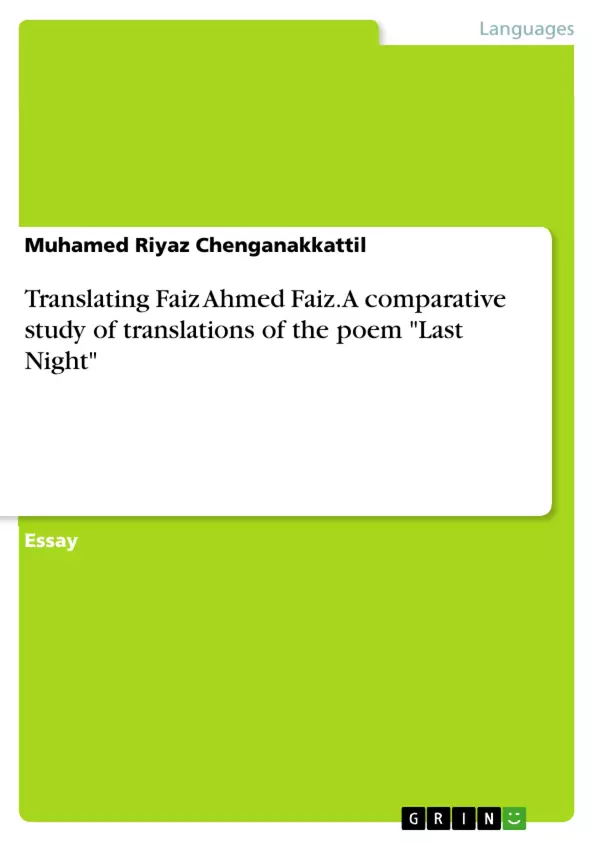This paper attempts to compare different translation of the Poem 'Last Night’ by the famous Urdu poet Faiz Ahmed Faiz. It has analyzed the poem from structural, semantic, and thematic perspectives. Translators who hail from different backgrounds have looked at the poem from different angles, thus it influenced the translating practice.
Inhaltsverzeichnis (Table of Contents)
- Translating Faiz: Comparative Study of Translations of the Poem 'Last Night'
- Introduction
- Methods of Translation
- Comparative Analysis of "Last Night"
- The Title
- The Word 'Dil'
- The Word 'Khoi Hui Yaad'
- The Word 'Veerana'
- The Word 'Chupke Se'
- The Word 'Bahaar'
- The Word 'Sahraon'
- The Phrase 'Baade Naseem'
- The Word 'Haule Se'
- The Word 'Beemaar'
- The Word 'Qarar'
- Conclusion
Zielsetzung und Themenschwerpunkte (Objectives and Key Themes)
This study explores the diverse translations of Faiz Ahmed Faiz's Urdu poem "Last Night" in English, providing a comparative analysis of different translators' approaches and the resulting interpretations.
- Translators' Techniques: The study investigates the different methods employed by translators, including literal versus free translations, rhythmic and emotional interpretations, and the consideration of cultural context.
- Word Choice and Meaning: The analysis delves into the translators' choices for key words, including their ability to convey the nuances of meaning, evoke specific emotions, and maintain the original rhythm of the poem.
- Polyphonic Interpretation: The study highlights the polyphonicity of Faiz's poetry, demonstrating how translators contribute to a multifaceted understanding of the original text.
- Cultural Context and Translation: The study explores the role of cultural context in translation, examining how translators navigate the challenges of conveying Urdu poetry to English-speaking audiences.
- Translating Poetry: The study examines the challenges and complexities of translating poetry, particularly the need to balance literal accuracy with artistic expression.
Zusammenfassung der Kapitel (Chapter Summaries)
- Introduction: This chapter introduces Faiz Ahmed Faiz, a prominent Urdu poet of the 20th century, and the significance of his translations into English. It also provides a brief overview of the different translators who have rendered Faiz's work into English, highlighting their diverse backgrounds and approaches.
- Methods of Translation: This chapter explores various translation methods employed by translators, including literal translation, free translation, and the use of rhythmic and emotional interpretation. It examines the challenges and opportunities of each method, highlighting the translators' attempts to balance accuracy with artistic expression.
- Comparative Analysis of "Last Night": This chapter provides a detailed analysis of the different translations of Faiz's poem "Last Night," focusing on the translators' choices for key words, phrases, and images. It investigates the impact of these choices on the overall interpretation of the poem, highlighting the diversity of perspectives that emerge from the different translations.
Schlüsselwörter (Keywords)
This study focuses on Faiz Ahmed Faiz, Urdu poetry, translation, comparative analysis, polyphonicity, cultural context, word choice, emotional interpretation, rhythmic identity, literary translation, and the challenges of conveying Urdu poetry to English-speaking audiences.
- Citation du texte
- Muhamed Riyaz Chenganakkattil (Auteur), 2016, Translating Faiz Ahmed Faiz. A comparative study of translations of the poem "Last Night", Munich, GRIN Verlag, https://www.grin.com/document/346437



